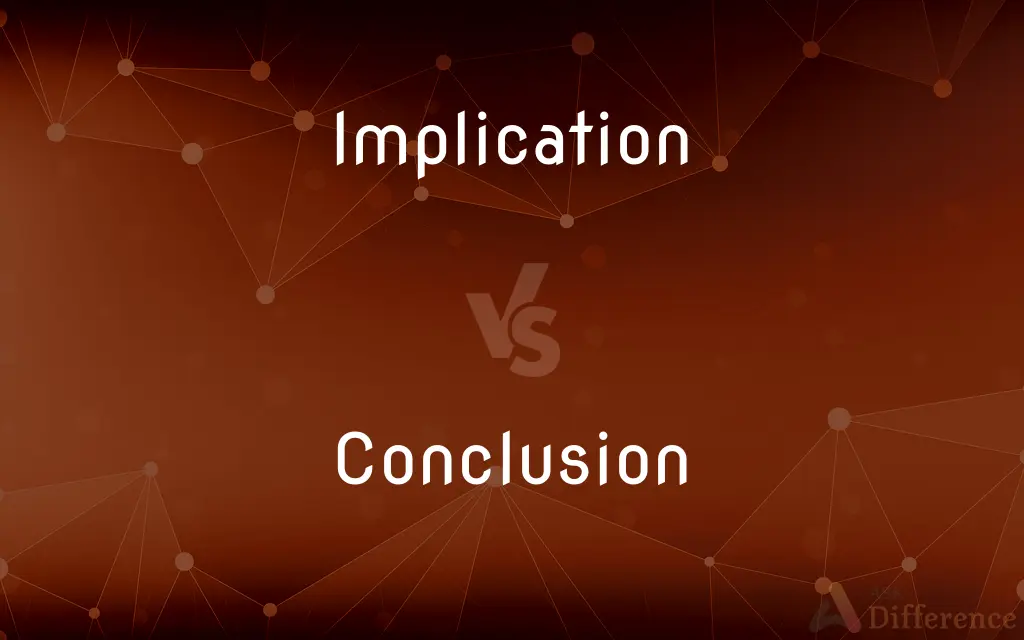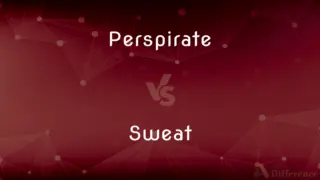Implication vs. Conclusion — What's the Difference?
Edited by Tayyaba Rehman — By Urooj Arif — Updated on April 17, 2024
Implication subtly suggests something without explicit statement, focusing on indirect meaning; conclusion directly deduces a result or decision from data or statements, emphasizing finality and clarity.

Difference Between Implication and Conclusion
Table of Contents
ADVERTISEMENT
Key Differences
An implication is an indirect indication about a general truth or hypothesis, often derived from observations or statements, whereas a conclusion is a definitive statement or decision reached after analyzing data or arguments. Both play pivotal roles in reasoning and argumentation but serve different functions.
In logic, implications often serve as the premises that lead to a conclusion, guiding the flow of an argument without providing the final judgment. On the other hand, a conclusion sums up the reasoning, providing a clear and explicit outcome based on the preceding implications.
Implications can exist without leading to a firm conclusion, suggesting possibilities or hints without commitment. Conversely, conclusions require preceding data or implications and aim to finalize thoughts or resolve questions.
The strength of an implication can vary, sometimes being strong enough to almost ensure a conclusion, while at other times remaining too weak to be conclusive. In contrast, conclusions are typically presented with confidence and are expected to be supported by strong and compelling evidence.
In everyday language, implications are often used to convey thoughts indirectly, such as in diplomacy or casual conversation, to maintain politeness or ambiguity. Conclusions, however, are used when clarity and decisiveness are necessary, such as in academic writing or legal judgments.
ADVERTISEMENT
Comparison Chart
Definition
An indirect suggestion or possibility
A final decision or judgment
Role in Argument
Serves as a premise leading to conclusions
Ends an argument or discussion
Explicitness
Typically indirect or subtle
Direct and clear
Certainty
Often suggestive with possible uncertainty
Provides closure with definitive judgment
Common Use
Used in informal settings and speculative talk
Used in formal analyses and decision-making
Compare with Definitions
Implication
A hint or indirect indication.
She left the implication hanging in the air that they might move.
Conclusion
The end or finish of an event, process, or text.
The conclusion of the film left the audience speechless.
Implication
Something suggested without being explicitly stated.
His tone carried the implication of dissatisfaction.
Conclusion
A final part of something, typically a document or speech.
He added a strong conclusion to his essay.
Implication
A likely consequence or effect.
The implication of his statement is that more changes are coming.
Conclusion
The summing-up of an argument or text.
The report's conclusion outlines the main findings.
Implication
A logical relationship where one thing indicates another.
In logic, 'if p then q' is an implication.
Conclusion
A termination or closure of a formal agreement or negotiation.
The negotiation reached a peaceful conclusion.
Implication
A possible future effect or result.
The financial implications of the decision were considerable.
Conclusion
A judgment or decision reached by reasoning.
His conclusion was based on solid evidence.
Implication
The conclusion that can be drawn from something although it is not explicitly stated
The implication is that no one person at the bank is responsible
Conclusion
The close or last part; the end or finish
The conclusion of the festivities.
Implication
The action or state of being involved in something
Our implication in the problems
Conclusion
The result or outcome of an act or process
What was the conclusion of all these efforts?.
Implication
The act of implicating or the condition of being implicated.
Conclusion
A judgment or decision reached after deliberation.
Implication
The act of implying or the condition of being implied.
Conclusion
A final arrangement or settlement, as of a treaty.
Implication
An indirect indication; a suggestion.
Conclusion
(Law) The formal closing of a legal complaint or pleading.
Implication
An implied meaning; implicit significance.
Conclusion
A proposition that follows from the premises of a formal proof, for instance from the major and minor premises of a syllogism.
Implication
An inference. See Usage Note at infer.
Conclusion
The proposition concluded from one or more premises; a deduction.
Implication
(uncountable) The act of implicating.
Conclusion
The end, finish, close or last part of something.
Implication
(uncountable) The state of being implicated.
Conclusion
The outcome or result of a process or act.
Implication
(countable) A possible effect or result of a decision or action.
Conclusion
A decision reached after careful thought.
The board has come to the conclusion that the proposed takeover would not be in the interest of our shareholders.
Implication
An implying, or that which is implied, but not expressed; an inference, or something which may fairly be understood, though not expressed in words.
Conclusion
(logic) In an argument or syllogism, the proposition that follows as a necessary consequence of the premises.
Implication
The connective in propositional calculus that, when joining two predicates A and B in that order, has the meaning "if A is true, then B is true".
Conclusion
(obsolete) An experiment, or something from which a conclusion may be drawn.
Implication
Logical consequence. en
Conclusion
(law) The end or close of a pleading, for example, the formal ending of an indictment, "against the peace", etc.
Implication
The act of implicating, or the state of being implicated.
Three principal causes of firmness are. the grossness, the quiet contact, and the implication of component parts.
Conclusion
(law) An estoppel or bar by which a person is held to a particular position.
Implication
An implying, or that which is implied, but not expressed; an inference, or something which may fairly be understood, though not expressed in words.
Whatever things, therefore, it was asserted that the king might do, it was a necessary implication that there were other things which he could not do.
Conclusion
The last part of anything; close; termination; end.
A fluorish of trumpets announced the conclusion of the contest.
Implication
Something that is inferred (deduced or entailed or implied);
His resignation had political implications
Conclusion
Final decision; determination; result.
And the conclusion is, she shall be thine.
Implication
A meaning that is not expressly stated but can be inferred;
The significance of his remark became clear only later
The expectation was spread both by word and by implication
Conclusion
Any inference or result of reasoning.
Implication
An accusation that brings into intimate and usually incriminating connection
Conclusion
The inferred proposition of a syllogism; the necessary consequence of the conditions asserted in two related propositions called premises. See Syllogism.
He granted him both the major and minor, but denied him the conclusion.
Implication
A logical relation between propositions p and q of the form `if p then q'; if p is true then q cannot be false
Conclusion
Drawing of inferences.
Your wife Octavia, with her modest eyesAnd still conclusion.
Implication
A relation implicated by virtue of involvement or close connection (especially an incriminating involvement);
He was suspected of implication in several robberies
Conclusion
An experiment, or something from which a conclusion may be drawn.
We practice likewise all conclusions of grafting and inoculating.
Conclusion
The end or close of a pleading, e.g., the formal ending of an indictment, "against the peace," etc.
Like the famous ape,To try conclusions, in the basket creep.
Conclusion
A position or opinion or judgment reached after consideration;
A decision unfavorable to the opposition
His conclusion took the evidence into account
Satisfied with the panel's determination
Conclusion
An intuitive assumption;
Jump to a conclusion
Conclusion
The temporal end; the concluding time;
The stopping point of each round was signaled by a bell
The market was up at the finish
They were playing better at the close of the season
Conclusion
Event whose occurrence ends something;
His death marked the ending of an era
When these final episodes are broadcast it will be the finish of the show
Conclusion
The proposition arrived at by logical reasoning (such as the proposition that must follow from the major and minor premises of a syllogism)
Conclusion
The act of ending something;
The termination of the agreement
Conclusion
A final settlement;
The conclusion of a business deal
The conclusion of the peace treaty
Conclusion
The last section of a communication;
In conclusion I want to say...
Conclusion
The act of making up your mind about something;
The burden of decision was his
He drew his conclusions quickly
Common Curiosities
Can an implication lead directly to a conclusion?
Yes, in many cases, an implication can provide enough foundation to directly lead to a conclusion, especially in logical or deductive reasoning.
What is an implication in a statement?
An implication in a statement is an indirect or hinted-at meaning that is not explicitly stated.
Are implications always intentional?
Not necessarily; sometimes implications can be unintended, especially if the speaker is not aware of how their words might be interpreted.
What is a logical implication?
A logical implication is a relationship between two statements where if the first is true, the second must also be true.
How are implications used in literature?
In literature, implications are used to add depth to narratives, allowing readers to infer meanings beyond what is explicitly described.
How does a conclusion differ from a summary?
A conclusion offers a final decision or judgment, often after deliberation or analysis, whereas a summary merely condenses the main points.
How can one identify implications in a conversation?
Identifying implications requires listening to subtleties in speech and understanding the broader context and possible meanings behind what is said.
What role do conclusions play in scientific research?
In scientific research, conclusions are crucial as they synthesize findings and suggest the relevance, applications, or need for further research.
Is it possible to have a conclusion without implications?
Generally, conclusions are based on implications or established facts; without any preceding information, it would not typically be considered a conclusion.
What are the implications of an action?
The implications of an action refer to the indirect consequences or effects that may logically follow from that action.
Can a conclusion be wrong?
Yes, a conclusion can be incorrect if it is based on faulty reasoning, incomplete data, or misinterpretations of the implications.
What makes a strong conclusion?
A strong conclusion is clear, direct, well-supported by data or evidence, and effectively sums up the findings or arguments.
How do implications affect decision-making?
Implications can significantly affect decision-making by introducing potential outcomes or considerations that influence choices.
Can conclusions affect one's reputation?
Yes, the quality and nature of one's conclusions can impact their reputation, particularly in professional or academic fields where judgment and expertise are critical.
Why is it important to understand implications in communication?
Understanding implications enhances comprehension and interpersonal relations, as much of communication relies on unspoken contexts.
Share Your Discovery

Previous Comparison
Visuality vs. Visibility
Next Comparison
Perspirate vs. SweatAuthor Spotlight
Written by
Urooj ArifUrooj is a skilled content writer at Ask Difference, known for her exceptional ability to simplify complex topics into engaging and informative content. With a passion for research and a flair for clear, concise writing, she consistently delivers articles that resonate with our diverse audience.
Edited by
Tayyaba RehmanTayyaba Rehman is a distinguished writer, currently serving as a primary contributor to askdifference.com. As a researcher in semantics and etymology, Tayyaba's passion for the complexity of languages and their distinctions has found a perfect home on the platform. Tayyaba delves into the intricacies of language, distinguishing between commonly confused words and phrases, thereby providing clarity for readers worldwide.















































